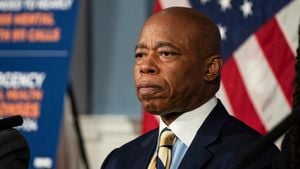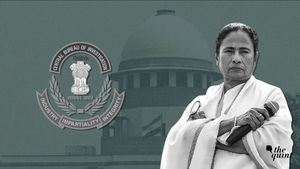Jamie Oliver, the celebrity chef known for his culinary expertise and engaging cooking shows, recently found himself at the center of controversy with his latest children's book, Billy and the Epic Escape. This book, depicting the story of Ruby, a First Nations girl with magical abilities living in central Australia, has sparked significant backlash from Indigenous communities and advocates who argue it perpetuates harmful stereotypes.
When Dr. Lilly Brown, CEO of the Broome-based Indigenous publishing house Magabala Books, first encountered Oliver's book, her reaction was nothing short of shock. She openly expressed her concerns, stating, "Jamie Oliver’s book continues to peddle negative stereotypical tropes and representations of First Nations people, and their family structures." Dr. Brown elaborated on how the narrative arc involving the removal of a First Nations child is particularly sensitive due to Australia's painful history with the Stolen Generations.
The controversy escalated when the National Aboriginal and Torres Strait Islander Education Corporation (NATSIEC) condemned the book, highlighting its role in the "erasure, trivialisation and stereotyping of First Nations peoples and experiences." Following the uproar, Penguin Random House, Oliver's publisher, decided to withdraw Billy and the Epic Escape from store shelves worldwide.
Oliver himself stated he was "devastated" to learn of the hurt his book caused, insisting it was never his intention to misrepresent such significant issues. He described the book as meant to be a "love letter to the First Nations peoples," which makes the respective criticisms even more painful for him.
The chapter at the heart of the uproar is titled "To Steal a Child" and revolves around Ruby, who is kidnapped from her home. Critics, including Wiradjuri writer and academic Jeanine Leane, expressed their outrage, stating, "The deep insensitivity of it is problematic!" Leane articulated how the portrayal of Indigenous people as magical beings contributes to the dangerous mythologization of their culture, emphasizing, "Aboriginal culture is not magic or superstition. It is realism. It is not to be trivialised like this."
NATSIEC, which led the movement to withdraw the book, noted with disappointment the absence of consultation with Indigenous individuals or organizations during the book's creation. This oversight was echoed across several critiques, with many arguing it is indicative of the broader issue of cultural appropriation within the publishing industry.
Dr. Brown highlighted the importance of including First Nations voices, asserting, "When a non-Aboriginal person is telling a First Nations story, it continues quite an extractive and colonial approach." She advocated for more representation and investment in First Nations authors themselves, illuminating the danger of commodifying their stories without proper acknowledgement and respect.
Coinciding with this debate is the concept of sensitivity readers, who ideally help authors navigate cultural nuances and avoid perpetuating stereotypes. Penguin acknowledged their failure to consult with such readers, resulting in consequences for both the author and the publisher. On this notion, Angie Faye Martin, a sensitivity editor, explained how these professionals work to identify and address potentially offensive elements, contributing to more respectful and accurate representations of diverse identities.
While Oliver has recognized his missteps, he has been called upon to engage with Indigenous communities directly. Some believe he could potentially amend the book with the right perspectives. Yet, Jeanine Leane maintains, "It is important to represent diversity, but you don't represent it from a knowing position."
Moving forward, the situation emphasizes the need for diligence and sensitivity within the publishing industry, particularly concerning marginalized groups. This incident serves as both a cautionary tale and a call to action for authors and publishers alike—the importance of collaboration and respect when addressing cultures outside one's own.
The path forward remains unclear for Jamie Oliver's foray beyond cookbooks, as he now faces the reality of rewriting or even potentially abandoning this narrative. The apologies offered and lessons learned may still manifest as something positive, but only if matched with genuine efforts to engage and uplift Indigenous voices.
Through this series of events, the controversy surrounding Billy and the Epic Escape has spotlighted not only the need for accurate cultural representation but also the responsibility of well-known figures to consult and collaborate with those whose stories they seek to tell. The combination of public outcry and the withdrawal of the book from shelves reveals just how far-reaching the repercussions can be when cultural narratives are misrepresented.



